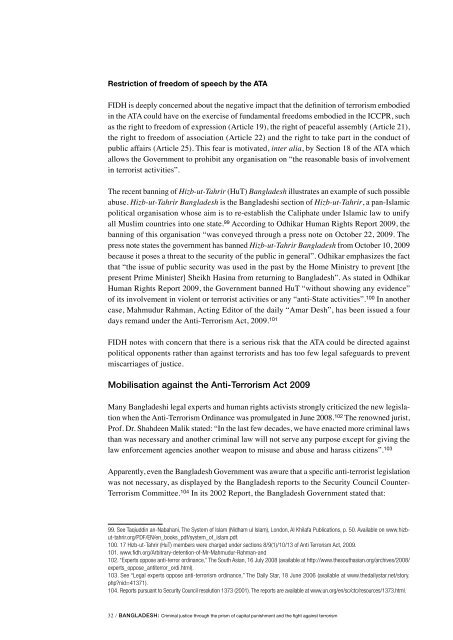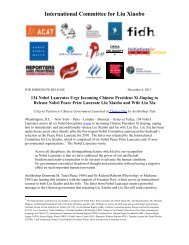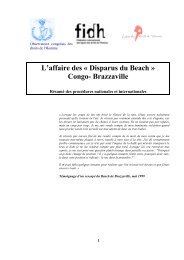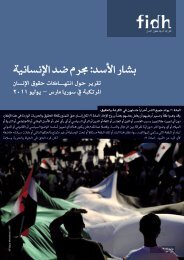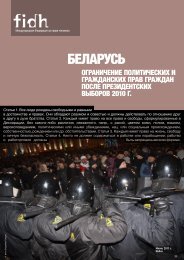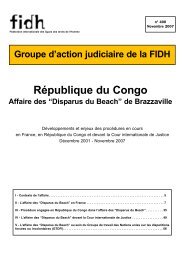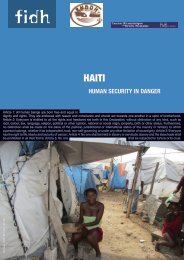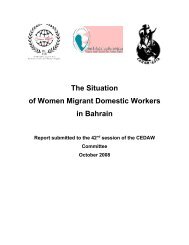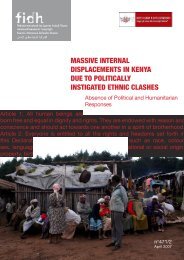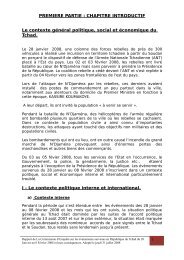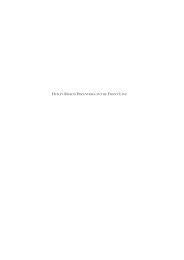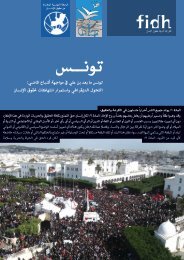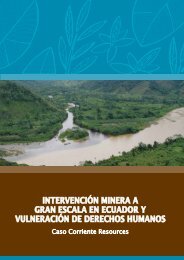BANGLADESH: Criminal justice through the prism of capital ... - FIDH
BANGLADESH: Criminal justice through the prism of capital ... - FIDH
BANGLADESH: Criminal justice through the prism of capital ... - FIDH
You also want an ePaper? Increase the reach of your titles
YUMPU automatically turns print PDFs into web optimized ePapers that Google loves.
Restriction <strong>of</strong> freedom <strong>of</strong> speech by <strong>the</strong> ATA<br />
<strong>FIDH</strong> is deeply concerned about <strong>the</strong> negative impact that <strong>the</strong> definition <strong>of</strong> terrorism embodied<br />
in <strong>the</strong> ATA could have on <strong>the</strong> exercise <strong>of</strong> fundamental freedoms embodied in <strong>the</strong> ICCPR, such<br />
as <strong>the</strong> right to freedom <strong>of</strong> expression (Article 19), <strong>the</strong> right <strong>of</strong> peaceful assembly (Article 21),<br />
<strong>the</strong> right to freedom <strong>of</strong> association (Article 22) and <strong>the</strong> right to take part in <strong>the</strong> conduct <strong>of</strong><br />
public affairs (Article 25). This fear is motivated, inter alia, by Section 18 <strong>of</strong> <strong>the</strong> ATA which<br />
allows <strong>the</strong> Government to prohibit any organisation on “<strong>the</strong> reasonable basis <strong>of</strong> involvement<br />
in terrorist activities”.<br />
The recent banning <strong>of</strong> Hizb-ut-Tahrir (HuT) Bangladesh illustrates an example <strong>of</strong> such possible<br />
abuse. Hizb-ut-Tahrir Bangladesh is <strong>the</strong> Bangladeshi section <strong>of</strong> Hizb-ut-Tahrir, a pan-Islamic<br />
political organisation whose aim is to re-establish <strong>the</strong> Caliphate under Islamic law to unify<br />
all Muslim countries into one state. 99 According to Odhikar Human Rights Report 2009, <strong>the</strong><br />
banning <strong>of</strong> this organisation “was conveyed <strong>through</strong> a press note on October 22, 2009. The<br />
press note states <strong>the</strong> government has banned Hizb-ut-Tahrir Bangladesh from October 10, 2009<br />
because it poses a threat to <strong>the</strong> security <strong>of</strong> <strong>the</strong> public in general”. Odhikar emphasizes <strong>the</strong> fact<br />
that “<strong>the</strong> issue <strong>of</strong> public security was used in <strong>the</strong> past by <strong>the</strong> Home Ministry to prevent [<strong>the</strong><br />
present Prime Minister] Sheikh Hasina from returning to Bangladesh”. As stated in Odhikar<br />
Human Rights Report 2009, <strong>the</strong> Government banned HuT “without showing any evidence”<br />
<strong>of</strong> its involvement in violent or terrorist activities or any “anti-State activities”. 100 In ano<strong>the</strong>r<br />
case, Mahmudur Rahman, Acting Editor <strong>of</strong> <strong>the</strong> daily “Amar Desh”, has been issued a four<br />
days remand under <strong>the</strong> Anti-Terrorism Act, 2009. 101<br />
<strong>FIDH</strong> notes with concern that <strong>the</strong>re is a serious risk that <strong>the</strong> ATA could be directed against<br />
political opponents ra<strong>the</strong>r than against terrorists and has too few legal safeguards to prevent<br />
miscarriages <strong>of</strong> <strong>justice</strong>.<br />
Mobilisation against <strong>the</strong> Anti-Terrorism Act 2009<br />
Many Bangladeshi legal experts and human rights activists strongly criticized <strong>the</strong> new legislation<br />
when <strong>the</strong> Anti-Terrorism Ordinance was promulgated in June 2008. 102 The renowned jurist,<br />
Pr<strong>of</strong>. Dr. Shahdeen Malik stated: “In <strong>the</strong> last few decades, we have enacted more criminal laws<br />
than was necessary and ano<strong>the</strong>r criminal law will not serve any purpose except for giving <strong>the</strong><br />
law enforcement agencies ano<strong>the</strong>r weapon to misuse and abuse and harass citizens”. 103<br />
Apparently, even <strong>the</strong> Bangladesh Government was aware that a specific anti-terrorist legislation<br />
was not necessary, as displayed by <strong>the</strong> Bangladesh reports to <strong>the</strong> Security Council Counter-<br />
Terrorism Committee. 104 In its 2002 Report, <strong>the</strong> Bangladesh Government stated that:<br />
99. See Taqiuddin an-Nabahani, The System <strong>of</strong> Islam (Nidham ul Islam), London, Al Khilafa Publications, p. 50. Available on www.hizbut-tahrir.org/PDF/EN/en_books_pdf/system_<strong>of</strong>_islam.pdf.<br />
100. 17 Hizb-ut-Tahrir (HuT) members were charged under sections 8/9(1)/10/13 <strong>of</strong> Anti Terrorism Act, 2009.<br />
101. www.fidh.org/Arbitrary-detention-<strong>of</strong>-Mr-Mahmudur-Rahman-and<br />
102. “Experts oppose anti-terror ordinance,” The South Asian, 16 July 2008 (available at http://www.<strong>the</strong>southasian.org/archives/2008/<br />
experts_oppose_antiterror_ordi.html).<br />
103. See “Legal experts oppose anti-terrorism ordinance,” The Daily Star, 18 June 2006 (available at www.<strong>the</strong>dailystar.net/story.<br />
phpnid=41371).<br />
104. Reports pursuant to Security Council resolution 1373 (2001). The reports are available at www.un.org/en/sc/ctc/resources/1373.html.<br />
32 / <strong>BANGLADESH</strong>: <strong>Criminal</strong> <strong>justice</strong> <strong>through</strong> <strong>the</strong> <strong>prism</strong> <strong>of</strong> <strong>capital</strong> punishment and <strong>the</strong> fight against terrorism


